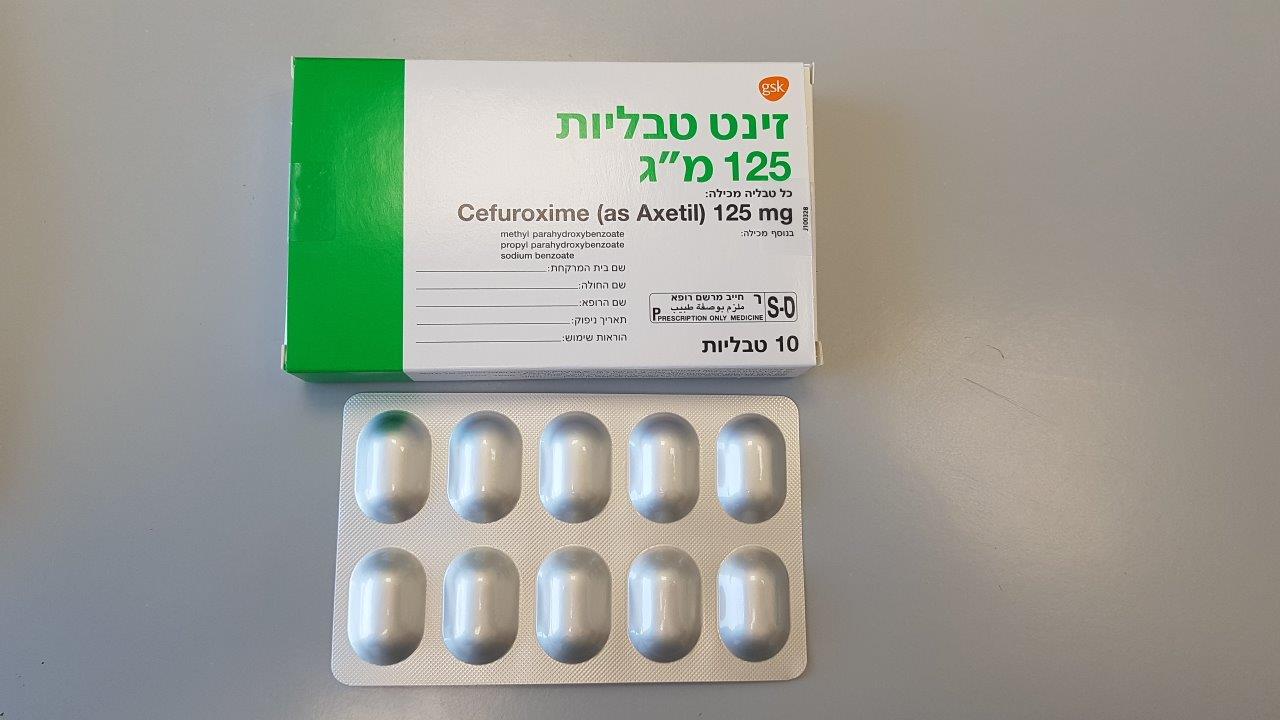Quest for the right Drug

זינט טבליות 125 מ"ג ZINNAT TABLETS 125 MG (CEFUROXIME AS AXETIL)
תרופה במרשם
תרופה בסל
נרקוטיקה
ציטוטוקסיקה
צורת מתן:
פומי : PER OS
צורת מינון:
טבליה : TABLETS
עלון לרופא
מינוניםPosology התוויות
Indications תופעות לוואי
Adverse reactions התוויות נגד
Contraindications אינטראקציות
Interactions מינון יתר
Overdose הריון/הנקה
Pregnancy & Lactation אוכלוסיות מיוחדות
Special populations תכונות פרמקולוגיות
Pharmacological properties מידע רוקחי
Pharmaceutical particulars אזהרת שימוש
Special Warning עלון לרופא
Physicians Leaflet
Posology : מינונים
4.2 Posology and method of administration Posology The usual course of therapy is seven days (may range from five to ten days). Table 1. Adults and children (40 kg) Indication Dosage Acute tonsillitis and pharyngitis, acute bacterial 250 mg twice daily sinusitis Acute otitis media 500 mg twice daily Acute exacerbations of chronic bronchitis 500 mg twice daily Cystitis 250 mg twice daily Pyelonephritis 250 mg twice daily Uncomplicated skin and soft tissue infections 250 mg twice daily Lyme disease 500 mg twice daily for 14 days (range of 10 to 21 days) Table 2. Children (<40 kg) Indication Dosage Acute tonsillitis and pharyngitis, acute 10 mg/kg twice daily to a maximum of 125 bacterial sinusitis mg twice daily Children aged two years or older with otitis 15 mg/kg twice daily to a maximum of 250 media or, where appropriate, with more mg twice daily severe infections Cystitis 15 mg/kg twice daily to a maximum of 250 mg twice daily Pyelonephritis 15 mg/kg twice daily to a maximum of 250 mg twice daily for 10 to 14 days Uncomplicated skin and soft tissue 15 mg/kg twice daily to a maximum of 250 infections mg twice daily Lyme disease 15 mg/kg twice daily to a maximum of 250 mg twice daily for 14 days (10 to 21 days) There is no experience of using Zinnat in children under the age of 3 months. Cefuroxime axetil tablets and cefuroxime axetil granules for oral suspension are not bioequivalent and are not substitutable on a milligram-per-milligram basis (see section 5.2). Renal impairment The safety and efficacy of cefuroxime axetil in patients with renal failure have not been established. Cefuroxime is primarily excreted by the kidneys. In patients with markedly impaired renal function it is recommended that the dosage of cefuroxime should be reduced to compensate for its slower excretion. Cefuroxime is effectively removed by dialysis. Table 5. Recommended doses for Zinnat in renal impairment Creatinine clearance T1/2 (hrs) Recommended dosage ≥30 ml/min/1.73 m2 1.4–2.4 no dose adjustment necessary (standard dose of 125 mg to 500 mg given twice daily) 10-29 ml/min/1.73 m2 4.6 standard individual dose given every 24 hours <10 ml/min/1.73 m2 16.8 standard individual dose given every 48 hours During haemodialysis 2–4 a single additional standard individual dose should be given at the end of each dialysis Hepatic impairment There are no data available for patients with hepatic impairment. Since cefuroxime is primarily eliminated by the kidney, the presence of hepatic dysfunction is expected to have no effect on the pharmacokinetics of cefuroxime. Method of administration Oral use Zinnat tablets should be taken after food for optimum absorption. Zinnat tablets should not be crushed and are therefore unsuitable for treatment of patients who cannot swallow tablets. In children Zinnat oral suspension may be used. Depending on the dosage, there are other presentations available.

שימוש לפי פנקס קופ''ח כללית 1994
Upper & lower respiratory tract infections (sinusitis, otitis, chronic bronchitis, pneumonia) genitourinary infections, pyelonephritis caused by: staphylococcus aureus & epidermidis (excluding methicillin resistant strains), streptococci (excluding enterococci), H. influenzae (including beta lactamase resistant strains) Branhamella catarrhalis, E. coli, klebsiella species, proteus mirabilis, proteus rettgeri, providencia, N. gonorrhea (including penicillinase producing strains)
תאריך הכללה מקורי בסל
01/01/1995
הגבלות
תרופה שאושרה לשימוש כללי בקופ'ח
מידע נוסף
